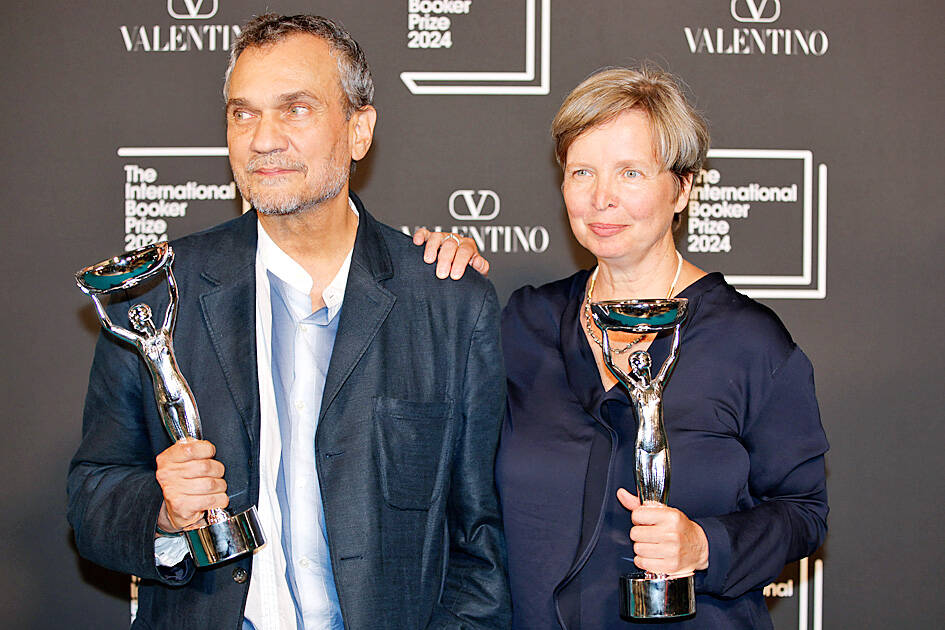German author Jenny Erpenbeck and translator Michael Hofmann on Tuesday won the International Booker Prize for fiction for Kairos, the story of a tangled love affair during the final years of the German Democratic Republic (GDR), or East Germany.
Erpenbeck said she hoped the book would help readers learn there was more to life in the now-vanished communist country than depicted in The Lives of Others, the Academy Award-winning 2006 film about pervasive state surveillance in the 1980s.
“The only thing that everybody knows is that they had a wall, they were terrorizing everyone with the Stasi, and that’s it,” she said. “That is not all there is.”

Photo: EPA-EFE
Kairos traces an affair from utopian beginning to bitter end, and draws parallels between personal lives and the life of the state.
The book beat five other finalists, chosen from 149 submitted novels, for the prize, which recognizes fiction works that have been translated into English and published in the UK or Ireland. The £50,000 (US$63,611) in prize money is divided between author and translator.
Canadian broadcaster Eleanor Wachtel, who chaired the five-member judging panel, said Erpenbeck’s novel about the relationship between a student and an older writer is “a richly textured evocation of a tormented love affair, the entanglement of personal and national transformations.”
It is set in the dying days of the GDR, leading up to the fall of the Berlin Wall. Erpenbeck, 57, was born and raised in East Berlin, which was part of the GDR until the country disappeared with German reunification in 1990.
“Like the GDR, [the book] starts with optimism and trust, then unravels so badly,” Wachtel said.
The International Booker Prize is awarded every year. It is run alongside the Booker Prize for English-language fiction, which is to be handed out in the fall.
Hofmann said he felt his style complemented that of the author.
“I think she is a tighter and more methodical writer than I would be,” he said, adding that the English-language book is “a mixture of her order and my chaos.”

PARLIAMENT CHAOS: Police forcibly removed Brazilian Deputy Glauber Braga after he called the legislation part of a ‘coup offensive’ and occupied the speaker’s chair Brazil’s lower house of Congress early yesterday approved a bill that could slash former Brazilian president Jair Bolsonaro’s prison sentence for plotting a coup, after efforts by a lawmaker to disrupt the proceedings sparked chaos in parliament. Bolsonaro has been serving a 27-year term since last month after his conviction for a scheme to stop Brazilian President Luiz Inacio Lula da Silva from taking office after the 2022 election. Lawmakers had been discussing a bill that would significantly reduce sentences for several crimes, including attempting a coup d’etat — opening up the prospect that Bolsonaro, 70, could have his sentence cut to

China yesterday held a low-key memorial ceremony for the 1937 Nanjing Massacre, with Chinese President Xi Jinping (習近平) not attending, despite a diplomatic crisis between Beijing and Tokyo over Taiwan. Beijing has raged at Tokyo since Japanese Prime Minister Sanae Takaichi last month said that a hypothetical Chinese attack on Taiwan could trigger a military response from Japan. China and Japan have long sparred over their painful history. China consistently reminds its people of the 1937 Nanjing Massacre, in which it says Japanese troops killed 300,000 people in what was then its capital. A post-World War II Allied tribunal put the death toll

A passerby could hear the cacophony from miles away in the Argentine capital, the unmistakable sound of 2,397 dogs barking — and breaking the unofficial world record for the largest-ever gathering of golden retrievers. Excitement pulsed through Bosques de Palermo, a sprawling park in Buenos Aires, as golden retriever-owners from all over Argentina transformed the park’s grassy expanse into a sea of bright yellow fur. Dog owners of all ages, their clothes covered in dog hair and stained with slobber, plopped down on picnic blankets with their beloved goldens to take in the surreal sight of so many other, exceptionally similar-looking ones.

‘UNWAVERING ALLIANCE’: The US Department of State said that China’s actions during military drills with Russia were not conducive to regional peace and stability The US on Tuesday criticized China over alleged radar deployments against Japanese military aircraft during a training exercise last week, while Tokyo and Seoul yesterday scrambled jets after Chinese and Russian military aircraft conducted joint patrols near the two countries. The incidents came after Japanese Prime Minister Sanae Takaichi triggered a dispute with Beijing last month with her remarks on how Tokyo might react to a hypothetical Chinese attack on Taiwan. “China’s actions are not conducive to regional peace and stability,” a US Department of State spokesperson said late on Tuesday, referring to the radar incident. “The US-Japan alliance is stronger and more